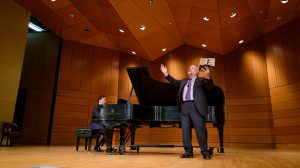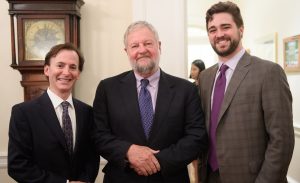
Bruce Levingston and David Rockefeller Jr. perform Tennyson’s ‘Enoch Arden’ at Nutt Auditorium. Photo by Robert Jordan/Ole Miss Communications
OXFORD, Miss. – Pianist Bruce Levingston draws on his longtime relationships with notable figures from the world of arts and humanities to provide unique opportunities for students in the University of Mississippi’s Sally McDonnell Barksdale Honors College.
Along the way, he also tries to show his friends a side of Mississippi that the mass media often ignores, resulting in many of them becoming fans of the state’s culture and people.
Levingston, the Chancellor’s Honors College Artist-in-Residence and holder of the Lester Glenn Fant Chair, has brought many prominent figures – including documentary filmmaker Ken Burns, prima ballerina assoluta Allessandra Ferri and Ron Chernow, Pulitzer Prize-winning biographer and author of “Hamilton” – to the Oxford campus. Most recently, Levingston hosted longtime friend and philanthropist David Rockefeller Jr. at Ole Miss.
Rockefeller’s visit included a performance with Levingston of Tennyson’s “Enoch Arden” at Nutt Auditorium, which was part of the events celebrating the investiture of Chancellor Jeffrey Vitter.
“Among their other wide-ranging interests, the Rockefellers care deeply about art and music,” Levingston said. “David Jr. is a superb singer as well as speaker, and we have performed together many times. We both love poetry and music, and with this work, we found the perfect piece that combines the exquisite words of a great poet and the sweeping emotionally charged music of master composer Richard Strauss.”

David Rockefeller Jr. Submitted photo
Levingston’s relationship with the Rockefeller family spans over three decades.
“David’s father, David Rockefeller Sr., now 101, has been one of the most important mentors in my life,” Levingston said. “David Jr., a wonderful thinker, philanthropist and outstanding leader in his generation of the family, has also become a dear friend over the years.”
The younger Rockefeller, one of the world’s leading conservationists of ocean and water resources, began his visit with a conversation among students from Levingston’s honor’s class, “Art and the Republic.” Topics ranged from water conservation and sustainable farming to issues of foreign relations regarding trade, government and human rights.
Levingston said he wants students to leave his class with a deeper understanding of art, creativity and problem-solving, as well as a sense of responsibility to one’s society.
“I want them to come away with the ability to discuss complex issues and hear different points of view with open ears, open eyes and open minds,” Levingston said. “Art, like life, is complex. There are many approaches, many roads to success and fulfillment and endless possibilities for interpretation.
“I want students to learn to be comfortable with the uncomfortable, with nuance, with uncertainty and with the idea that sometimes there are not easy answers, but most importantly, with an understanding that their voice counts and that they themselves may make a real difference in society.”
Much like his relationship with David Rockefeller Sr., Levingston serves as a mentor for many students, including Clay Wooley, a senior in the Honors College from Jackson.
Rockefeller’s visit to UM is an experience that Wooley said he will not soon forget.
“Seeing a man from a historically great American family come all the way to our state meant a lot to me personally as a Mississippian,” Wooley said. “Perhaps the most striking thing about Mr. Rockefeller was his ability to make himself relatable to everyone in the class. Each student who asked a question, including myself, was met with an open and honest response that carried a value and perspective that was tangible for everyone in the room.

Bruce Levingston (left) and David Rockefeller Jr. chat with UM honors student Clay Wooley. Photo by Robert Jordan/Ole Miss Communications
“I particularly enjoyed hearing Mr. Rockefeller discuss his conservation efforts and our responsibility to maintain and improve the environment. It is no secret that the Rockefeller family is responsible for the creation of many of our national parks, but to see that tradition passed down the generations gave me hope that one day I will be able to contribute as well.”
Besides sharing his friends’ insights with students, it is important to Levingston that his visitors experience his home state.
“I wanted David to see my homeland in the Delta,” Levingston said. “I also wanted him to see all of our history, good and bad, and not just a prettified version.
“We first stopped in Sumner and went to the courthouse where the Emmett Till murder trial had been held as well as the center for study about Till. Needless to say, it was incredibly moving.”
Rockefeller’s tour of the Delta continued with visits to McCarty’s Pottery, the B.B. King Museum and dinner at the legendary Lusco’s in Greenwood.
“I enjoyed a fantastic journey to the Delta,” Rockefeller said. “I am grateful to meet so many kind and generous people, and I want to thank the University of Mississippi for its gracious hospitality.”
Rockefeller left the state with a deeper understanding of who Mississippians are as a people, Levingston said.
“I believe he was truly moved by not only the quality of our students, but also our interest in growing and evolving, our efforts to embrace our own rich and complicated history while seeking to move forward to an even greater future,” Levingston said.